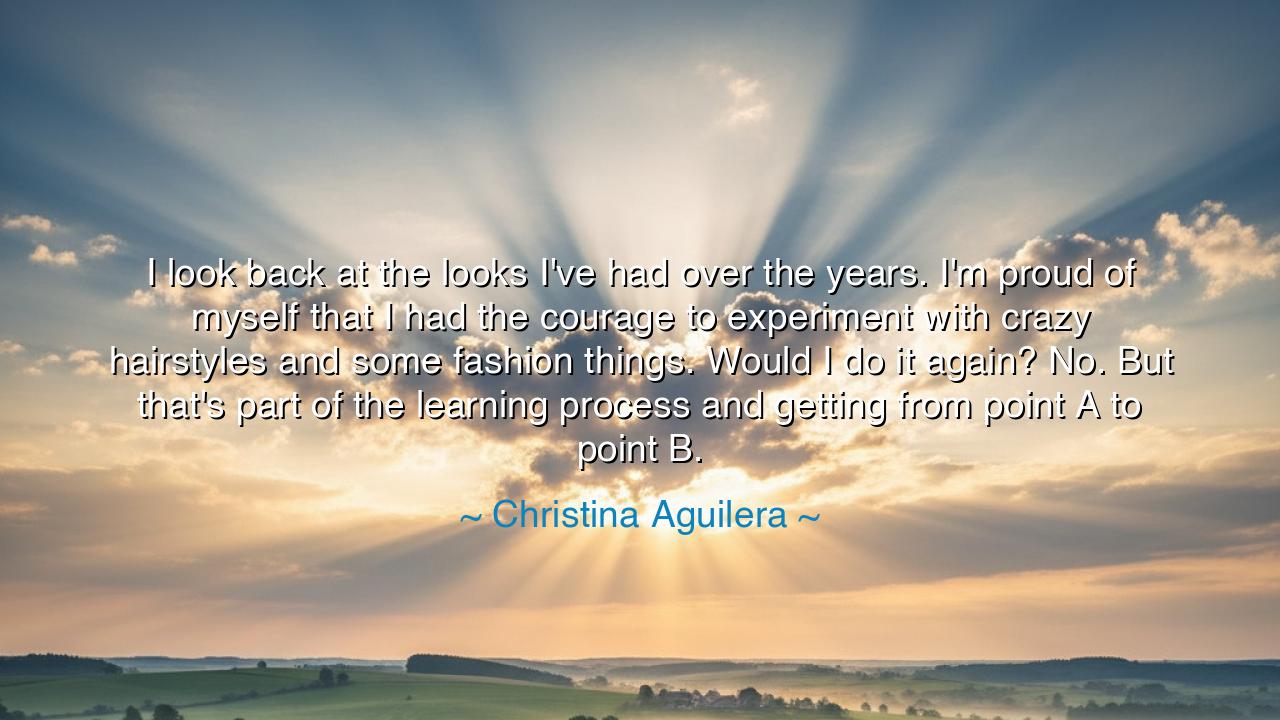
I look back at the looks I've had over the years. I'm proud of
I look back at the looks I've had over the years. I'm proud of myself that I had the courage to experiment with crazy hairstyles and some fashion things. Would I do it again? No. But that's part of the learning process and getting from point A to point B.






“I look back at the looks I’ve had over the years. I’m proud of myself that I had the courage to experiment with crazy hairstyles and some fashion things. Would I do it again? No. But that’s part of the learning process and getting from point A to point B.” — Thus spoke Christina Aguilera, the songstress whose voice has soared across decades and whose image has transformed with the winds of time. Behind these playful words lies not a tale of vanity, but a truth of the human spirit — that growth demands courage, experimentation, and sometimes the humility to look back and smile at one’s former self. Hers is a wisdom wrapped in color and sound, a reminder that the road to wisdom is paved with bold choices and brave mistakes.
Aguilera, like many artists before her, lived in the fierce light of public scrutiny. Every hairstyle, every costume, every transformation became a reflection of not only her art but her identity. In her youth, she dared to experiment — to push boundaries of appearance and expression when the world expected conformity. The “crazy hairstyles” and “fashion things” she mentions were not mere decorations, but declarations. They were acts of rebellion against fear, acts of self-discovery through risk. And though she admits that she would not repeat those choices, she honors them — for they were stepping stones, the necessary missteps that carried her from point A to point B, from uncertainty to self-knowledge.
This sentiment is ancient and profound. The ancient Greeks taught that the journey to wisdom is never straight; it is a spiral, looping through trial, error, and reflection. In their myths, even the gods learned through folly. Prometheus, in his daring to bring fire to mankind, defied divine order — and though punished, he gave humanity the spark of progress. So too does Aguilera speak to this divine recklessness — that sacred impulse to try, to create, to express oneself even when the world may not understand. For only through risk can the soul refine itself; only through the “crazy” can we arrive at the calm wisdom of maturity.
We might also remember the story of Catherine the Great, Empress of Russia, who as a young woman was mocked for her ambition and unconventional ideas. She, too, experimented — not with fashion, but with power, philosophy, and reform. Her early efforts were clumsy, her court doubting her, her failures public. Yet through those experiments, she grew into one of history’s most enlightened rulers. Like Aguilera, she could look back at her beginnings and say, “Would I do it again? No. But I had the courage to try.” In this, both women share the same truth: that experimentation, even when imperfect, is the forge of greatness.
Aguilera’s reflection also carries a subtle humility — the awareness that not all bold choices age well, and yet none are wasted. To look back without regret but with understanding is the mark of wisdom. Many cling to shame over their past selves, hiding the old photos, denying the missteps. But the wise do not despise their former versions; they bless them. For those younger selves were the ones who dared to act, to leap into the unknown. Without their courage, there would be no “point B.” Thus, Aguilera’s quote is not about fashion at all — it is about the beauty of evolution, the grace of forgiving oneself for the growing pains of becoming.
In her words we also hear an anthem for the artist in all of us — for every soul is, in some measure, an artist. We all craft ourselves, day by day, from clay and experience. To live fully is to experiment — to risk embarrassment, to stretch beyond the familiar, to let curiosity lead where comfort cannot. The one who fears looking foolish will never create beauty; the one who fears failure will never taste the sweetness of growth. Every stage of life demands its own courage — the courage to begin, the courage to change, and later, the courage to look back with kindness on what once was.
The lesson, then, is this: do not despise your past, even its wildest or most awkward chapters. They were necessary, and they were brave. Celebrate the courage it took to explore, even when you did not yet understand what you sought. Reflect, yes — but do not regret. Let each misstep remind you of your strength, each phase of your becoming a verse in the song of your life. Be proud not of perfection, but of persistence, of movement, of the will to keep going from point A to point B, and beyond.
So remember, my child: courage and curiosity are the instruments by which the soul plays its melody. You will change; you will look back and smile, perhaps even laugh at the boldness of your former self. That is good — for laughter is the sound of growth. Keep experimenting. Keep evolving. For the one who dares to be “crazy” today will one day stand wise and whole, saying, as Christina Aguilera did, “I am proud that I had the courage to become.”






AAdministratorAdministrator
Welcome, honored guests. Please leave a comment, we will respond soon